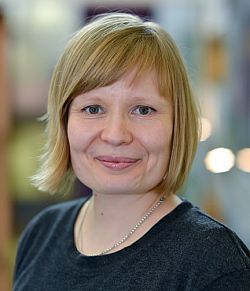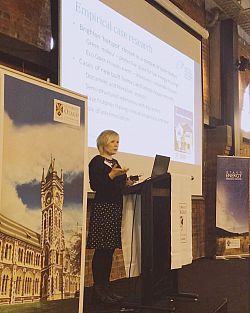Spotlight on Dr Mari Martiskainen
Research Fellow at the Centre on Innovation and Energy Demand
Previous Research
 It was never my initial plan to become an academic but for as long as I remember I was interested in environmental issues and renewable energy.
It was never my initial plan to become an academic but for as long as I remember I was interested in environmental issues and renewable energy.
As part of my degree in Communication Studies at Helsinki University, Finland, I did an Erasmus study at Loughborough in 1998 and fell in love with the UK.
After working for a couple of years in the marine fuels industry, I decided to do an MSc at Imperial College London specialising in Energy Policy. I then did some voluntary work with Friends of the Earth and started working for the then British Wind Energy Association, now RenewableUK. I met Prof Jim Watson, from the Sussex Energy Group (SEG), SPRU, at a conference, who encouraged me to apply for a Research Officer post at SEG which I got in 2006.
I found SPRU a really stimulating place to work and pursued a PhD in 2010, which I completed in 2014. My PhD focused on comparing community energy projects in Finland and the UK. I found it really interesting that community groups are developing sustainable energy projects, an area usually dominated by established energy companies.
Current Research
I started working at the Centre on Innovation and Energy Demand (CIED) in 2014 and my research has focused on building energy efficiency, especially on the role of intermediary organisations in supporting zero carbon new homes and whole house retrofits. This project, conducted together with Dr Paula Kivimaa from CIED, aims to identify how people could be encouraged to do more refurbishments in their homes and who are the organisations that could aid that. For example do you need to take a community approach involving a trusted organisation? We have six case studies in the Brighton area. People are happy to spend money on a new car, bathroom or kitchen, but not really on energy efficiency, it’s not seen as exciting.
I have also been looking at fuel poverty and working together with the community group South East London Community Energy, we have researched pop up energy cafés. Fuel poverty is a social, health and energy policy issue and it affects 2.34 million households in England alone. A lot of the housing stock in the UK is in really poor condition, it will cost a lot of money and disruption to peoples’ lives to get them retrofitted. If we frame energy efficiency around comfort and health, perhaps more people will take action. Energy cafés have been organised across the UK and they usually run over a week in a high street location. Anyone can attend to find out information energy efficiency measures and their energy bills.
What concerns me is that fuel poverty and especially the quality of our existing housing stock is left to be in the fringes of energy policy.
We are supposedly a very wealthy nation and still people die in the winter, it’s disgraceful. We often hear about the need to choose between whether you ‘eat or heat’ with elderly and disabled being particularly vulnerable but it also affects children’s ability to learn at school.
We wanted to find out the reasons for holding these energy cafés and who attends them?
If it’s in an area with a lot of fuel poverty, people are more likely to go in, some cafes had 200-300 people attend, others only 6. Fuel poverty can be really stigmatised, it’s not easy for people to say ‘I can’t afford to pay my fuel bills’ particularly in very small communities.
Off the back of the project lots of nice things have happened; we had an opportunity to work with Dr Brenda Boardman, a trustee of the funder Chesshire Lehmann Fund, who is a real pioneer of fuel poverty research. Our blog posts have been reposted and our presentation was in a workshop that the Energy Minister was attending. I have also presented at a conference in the US and I’m finalising an academic paper from the research.
Energy research as a research area is fantastic, I don’t think we’ll ever run out of topics, there’s always going to be challenges.
Our research is always linked to bigger, wider debates such as energy security, energy resource availability and fossil fuel emissions. We have the huge problem of climate change, unless we decarbonise our energy system we are going to have some serious problems, this is the overarching motivation for me.
The biggest challenge for an early career researcher like myself is ensuring a good balance of publications with impact work. It's a balancing act and it’s knowing what to prioritise. As an early career researcher, I’m very pleased to have my first single authored publication accepted earlier this year.  I have an 8 year old daughter, when she was younger balancing work life with a young child with research life was slightly challenging.
I have an 8 year old daughter, when she was younger balancing work life with a young child with research life was slightly challenging.
The Future
For the next couple of years it’s all about publications, funding and then some good engagement opportunities.
I love going to conferences as I really like the engagement side of my work.
I used to get nervous but now I really love speaking at conferences. It’s an opportunity for you to talk about and share your work. It’s also a great opportunity to travel, this year I’ve been to Brazil, Finland, the US, and New Zealand.
I’d definitely like to continue energy research and stay in SPRU. When my daughter is a bit older I would like to do a research visit to another institute internationally.
Mari's Links
Centre on Innovation and Energy Demand
Blog Posts:
New research project to investigate how communities can tackle fuel poverty – the silent killer
Fuel poverty research presented to Secretary of State for Energy and Climate Change
CIED contributes to conference session on energy and consumer behaviour in Brazil
Publications:
http://www.sussex.ac.uk/sussexenergygroup/people/person/197918
Research:
Low Energy Housing Innovations and the role of Intermediaries (LEHII)

